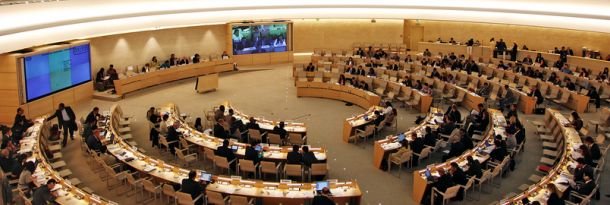Hoy, España declaró que «acepta parcialmente» las recomendaciones hechas por Namibia y Timor Oriental. En relación con el total de 13 recomendaciones que solo fueron parcialmente aceptadas por su país, el embajador de España ante las instituciones de la ONU con sede en Ginebra, declaró lo siguiente ante el Consejo de Derechos Humanos de la ONU : «Estamos de acuerdo en términos generales, pero solo podemos implementarlas parcialmente , si esto se debe a que existen diferencias en la forma en que las implementamos, o factores en nuestro orden legal, presupuestario o constitucional que impiden su plena implementación «.
Namibia respondió de inmediato y no se contuvo. «Sin embargo, Namibia lamenta señalar que sus recomendaciones sobre la explotación de los recursos del Territorio No Autónomo del Sáhara Occidental fueron aceptadas solo parcialmente por España. No debería ser una excusa para participar en la explotación ilegal de los recursos de las personas de WS. El derecho a decidir sobre los recursos encontrados en y en el territorio, y cómo explotarlos o conservarlos, pertenece exclusivamente a la gente de WS. Este derecho está articulado en los artículos comunes 1 del PIDCP y el PIDESC y debe ser respetado por la potencia ocupante y cualquier tercero como España. Por lo tanto, instamos a España a hacer lo correcto y garantizar la plena implementación de estas recomendaciones. Este deber se le debe al pueblo de WS.
In the UN Human Right Council today, Spain failed to assume responsibility with regard to the exploitation of occupied Western Sahara’s natural resources. Namibia is not having it.
In the framework of the 44th session of the UN Human Rights Council, Spain today, 16 July 2020, presented its response to the recommendations it had received during its third Universal Periodic Review; a peer review by other UN Member States of the country’s human rights slate.
During Spain’s third UPR session in January this year, Namibia and East Timor raised their concern about Spain’s involvement in the taking of Western Sahara’s natural resources. The two countries had formally issued four recommendations to Spain, that were noted in the «Report of the Working Group on the Universal Periodic Review – Spain«, a summary document published by the UNHRC in March 2020.
These are the recommendations made by Namibia and East Timor to Spain on Western Sahara:
150.56 – Enact appropriate national legislation to ensure that Spanish individuals and corporations do not unlawfully participate in the taking of Western Sahara’s resources (Namibia);
150.57 – Refrain from engaging in any economic activities relating to the territory of Western Sahara that does not have the free, prior and informed consent of the people of Western Sahara (Namibia);
150.59 – Ensure the full implementation of the Guiding Principles on Business and Human Rights in the context of the exploitation of Western Sahara’s natural resources (Timor-Leste);
150.60 – Refrain from engaging in any economic activities in or relating to the territory of Western Sahara that do not have the free, prior and informed consent of the people of the territory (Timor-Leste).
Namibia and Timor Leste were prior to independence from neighbouring South Africa and Indonesia themselves categorised both as non-self-governing and occupied, the same two statutes as applies to Western Sahara today.
Today, Spain declared that it «partially accepts» the recommendations made by Namibia and East Timor. In relation to the total of 13 recommendations that were only partially accepted by his country, Spain’s Ambassador to the Geneva-based UN institutions, stated the following to the UN Human Rights Council: «we agree in broad terms but we can only partially implement them, whether this is because there are differences as to how we implement them, or factors in our legal, budgetary or constitutional order that impede their full implementation».
Namibia responded immediately, and did not hold back. «Namibia however regrets to note that its recommendations on the exploitation of the resources of the Non-Self-Governing Territory of Western Sahara were only partially accepted by Spain. It should be no excuse to participate in the illegal exploitation of the resources of the people of WS. The right to decide over the resources found in and on the territory, and how to exploit them or conserve them, belongs exclusively to the people of WS. This right is articulated under common articles 1 of the ICCPR and ICESCR and must be respected by the occupying power and any third party such as Spain. We therefore urge Spain to do the right thing and ensure full implementation of these recommendations. This duty is owed to the people of WS, who continue to live in poverty while their resources are being plundered by the occupying power and companies of third countries», the country stated in front of the UN Human Rights Council.
Fuente: Namibia slams Spain for failing to respect Saharawi rights – wsrw.org
Descubre más desde No te olvides del Sahara Occidental
Suscríbete y recibe las últimas entradas en tu correo electrónico.

